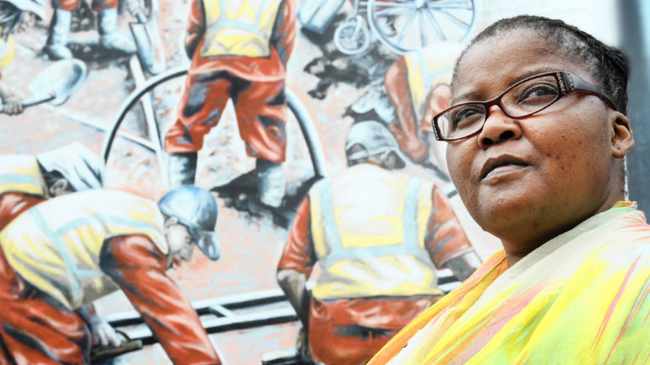
Gloria Kente is a live-in domestic worker in Cape Town. In 2013, her employer’s then-boyfriend got angry with her, allegedly grabbed her, spat in her face, and screamed a racist epithet at her. Kente called the police and had him charged with assault and a violation of her human and civil rights. She called him out for hate speech and harassment. When the man tried to extend `an apology’, Kente said, “NO!” If an apology meant not going to court, not having the State fully involved, then Gloria Kente wanted no part of it. Last November, the man was found guilty, and on Friday he heard his sentence.
The man was sentenced to two years house arrest, 70 hours of community service “in the service of Black women”, successful completion of various programs addressing substance abuse, prohibition from owning any firearms and from using any substances.
Gloria Kente was not in court on Friday, but her attorney said she was happy with the sentence.
As so often happens, the news coverage of this case focuses largely on the man. Employers disrespecting and abusing domestic workers is not news. Employers disrespecting and abusing domestic workers’ rights under the law is also not news. The news is that around the world, domestic workers are saying “NO!” to abuse. Around the world domestic workers are on the move, organizing, advocating, going to court and winning civil and criminal cases, organizing unions, consolidating power for domestic workers and for women workers generally. That’s the story.

In Hong Kong today, a court found that Erwiana Sulistyaningsih’s employer had indeed abused her. Her employer was found guilty of criminal intimidation, grievous bodily harm and wage theft. Again, the story is not the employer, but rather Erwiana Sulistyaningsih’s refusal to accept the veil of secrecy that enshrouds household labor. Erwiana Sulistyaningsih said “NO!” to the violence of like-one-of-the-family, and, instead, said “YES!” to workers’ right, women’s rights, migrants’ rights, humans’ rights, and every configuration thereof. As Erwiana Sulistyaningsih explained, after hearing the verdict: “To employers in Hong Kong, I hope they will start treating migrant workers as workers and human beings and stop treating us like slaves, because as human beings, we all have equal rights.”
In Lebanon, immigrant and migrant women domestic workers are organizing a union. In Pakistan domestic workers have formed their first trade union, partly as a response to increasing violence against domestic workers and partly as a response to the affirmative recognition of their combined rights and power. Last December, the Pakistan Workers Federation formed the Domestic Workers Trade Union. Of 235 members, 225 are women domestic workers. Sumaira Salamat, in Lahore, is a member: “It’s only in the last year-and-a-half that these women have finally realised the importance of what it means to become a united force. We want to be recognised as workers, just like our counterparts working in factories and hospitals are. We would also like to get old age benefits like pensions when we retire; but most of all we want better wages and proper terms of work.”
Everywhere, women domestic workers are on the move.
Remember that when you read about this court case or that decision and the abusive employer receives all or most of the attention. The days of employers owning history are over. Gloria Kente, Erwiana Sulistyaningsih, Sumaira Salamat are shaking the world up. Remember their names.
(Photo Credit: IOL / Jeffrey Abrahams) (Photo Credit: Philippe Lopez / Agence France – Press / Getty Images)